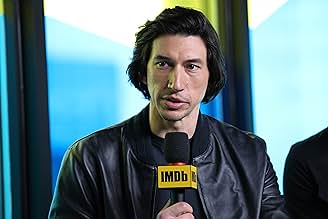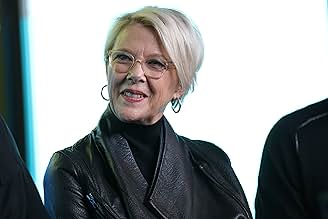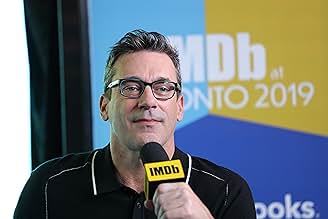Daniel Jones, um membro do Senado encarregado de conduzir uma investigação sobre o programa de detenção e interrogatório da CIA após 11 de setembro, revela segredos chocantes.Daniel Jones, um membro do Senado encarregado de conduzir uma investigação sobre o programa de detenção e interrogatório da CIA após 11 de setembro, revela segredos chocantes.Daniel Jones, um membro do Senado encarregado de conduzir uma investigação sobre o programa de detenção e interrogatório da CIA após 11 de setembro, revela segredos chocantes.
- Prêmios
- 4 vitórias e 13 indicações no total
Avaliações em destaque
How astonishingly difficult it is to deal with the CIA inour system of government.
'The Report' couldn't get made at a better time. With everything happening in today's American and global political climate, it shows how little the general public actually is allowed to know about whatever happens within the borders of their government buildings. An entire country is at stake when secrets come out, that shouldn't have been secrets in the first place when laws get executed correctly.
Idealistic Senate staffer Daniel J. Jones (Adam Driver), gets tasked by his boss, Senator of California Diane Feinstein (Annette Bening), to lead an investigation into the CIA's post 9/11 Detention and Interrogation Program. Jones' relentless pursuit of the truth leads to findings that uncover the lengths to which the nation's top intelligence agency went to destroy evidence, subvert the law, and hide a shocking secret from the American public.
Scott Z. Burns hasn't directed a feature length film since 2006's 'Pu-239'. Having previously written films such as, 'The Laundromat', 'Side Effects' and 'Contagion', it seems he has a very good work relationship with this films' producer Steven Soderbergh (director of last named films). With 'The Report' he knows what he's going for and doesn't hold back on any occasion. The story goes off like a missile, and only slows down when hitting its target at the finish line. That might be a challenge for some viewers, but the suspense throughout the second and third act is rare and delivers what political polymaths are looking for. To those who aren't particularly interested in politics and cover-ups, this might be a tough one to sit through.
Adam Driver, is truly on a roll these last couple of years. With two more films on the horizon in the last two months of 2019 ('Marriage Story' and 'Star Wars: The Rise of Skywalker'), it seems there's no stopping him in becoming one of the most talented actors of this generation. He shows just how focused and career driven he is as his character Daniel J. Jones. He's unsurpassed and will definitely get recognition for his hard work coming awards season.
What plays like a political 'Social Network', could've benefited from a rewrite by Aaron Sorkin, just to streamline it a bit more. The dialogues are heavy and littered with dark humour, but without any real character development, it misses the opportunity to make the audience connect with anyone on a deeper level. You never get to look behind the suits into their homes. The mental struggles of being accused of whistleblowing and torturing people, must take its toll on politicians and CIA-agents, no? We get little hints at their personal lives when being interrogated by government officials, but this is all just small talk. It does go without saying, Greg O'Bryant deserves much praise for editing this film. I wonder how long the rough cut must've been.
There's a wide range of well known actors passing by as fundamental characters in the big scheme of things. Annette Bening, brilliant actor taking on the full look and characteristics of Senator Feinstein, doesn't have many explosive scenes to wow, but is subtly captivating. Corey Stoll, Jon Hamm, Maura Tierney and Michael C. Hall all have important parts to keep things moving, but with the little amount of screen time fail to impress with anything more than acceptable.
Burns' 'The Report' is an important watch, delivering facts in a striking manner. It's worth watching for Driver's performance alone, observing a man who loves doing his job and excels at it. A history lesson in American politics and terrorism with a little dig at propaganda filmmaking and journalism, and a big spotlight on the CIA's misconduct.
Idealistic Senate staffer Daniel J. Jones (Adam Driver), gets tasked by his boss, Senator of California Diane Feinstein (Annette Bening), to lead an investigation into the CIA's post 9/11 Detention and Interrogation Program. Jones' relentless pursuit of the truth leads to findings that uncover the lengths to which the nation's top intelligence agency went to destroy evidence, subvert the law, and hide a shocking secret from the American public.
Scott Z. Burns hasn't directed a feature length film since 2006's 'Pu-239'. Having previously written films such as, 'The Laundromat', 'Side Effects' and 'Contagion', it seems he has a very good work relationship with this films' producer Steven Soderbergh (director of last named films). With 'The Report' he knows what he's going for and doesn't hold back on any occasion. The story goes off like a missile, and only slows down when hitting its target at the finish line. That might be a challenge for some viewers, but the suspense throughout the second and third act is rare and delivers what political polymaths are looking for. To those who aren't particularly interested in politics and cover-ups, this might be a tough one to sit through.
Adam Driver, is truly on a roll these last couple of years. With two more films on the horizon in the last two months of 2019 ('Marriage Story' and 'Star Wars: The Rise of Skywalker'), it seems there's no stopping him in becoming one of the most talented actors of this generation. He shows just how focused and career driven he is as his character Daniel J. Jones. He's unsurpassed and will definitely get recognition for his hard work coming awards season.
What plays like a political 'Social Network', could've benefited from a rewrite by Aaron Sorkin, just to streamline it a bit more. The dialogues are heavy and littered with dark humour, but without any real character development, it misses the opportunity to make the audience connect with anyone on a deeper level. You never get to look behind the suits into their homes. The mental struggles of being accused of whistleblowing and torturing people, must take its toll on politicians and CIA-agents, no? We get little hints at their personal lives when being interrogated by government officials, but this is all just small talk. It does go without saying, Greg O'Bryant deserves much praise for editing this film. I wonder how long the rough cut must've been.
There's a wide range of well known actors passing by as fundamental characters in the big scheme of things. Annette Bening, brilliant actor taking on the full look and characteristics of Senator Feinstein, doesn't have many explosive scenes to wow, but is subtly captivating. Corey Stoll, Jon Hamm, Maura Tierney and Michael C. Hall all have important parts to keep things moving, but with the little amount of screen time fail to impress with anything more than acceptable.
Burns' 'The Report' is an important watch, delivering facts in a striking manner. It's worth watching for Driver's performance alone, observing a man who loves doing his job and excels at it. A history lesson in American politics and terrorism with a little dig at propaganda filmmaking and journalism, and a big spotlight on the CIA's misconduct.
Scott Z. Burns has managed to create a contained, focused and relevant drama on important and true events. The movie is just as dedicated and willful as its main hero Daniel J. Jones, portrayed effectively by Adam Driver. Some will find it dry, some will rate it based on their political agendas, some will bash Adam Driver (for reasons I have never understood), but I think, while not without flaws, "The Report" is an admirable effort.
I'm thousands of miles away from the land of America, but I was at least vaguely familiar with the facts and happenings "The Report" is based on, the larger canvas was clear to me. "The Report" is not a spectacle, it's not overly dramatic, but moves at an even pace, offers constant flow of plot development instead of boredom - these are also the reasons why some may describe the movie as dry, promising a delivery that never comes - I get that, but I also disagree. Another satisfying aspect is the more than stellar cast, even most of the really small roles are filled by talented and known faces. Adam Driver has never failed me before, also not this time & I don't know wether the hate for him is a meme or just another dismissible and disrespectable creation by our ever degrading virtual society. I was slightly disappointed about Jon Hamm, whose face on the poster turned out to be more of a marketing device, as his total screen time amounted to around 10 minutes, maybe. I love me some Jon Hamm. All jokes aside, "The Report" might not be an exceptional, but definitely is a great effort on every level of filmmaking - acting, writing and directing included. If we talks visuals, the cinematography and aesthetical mood does nothing but adds to the overall tone and cinematic flow.
"The Report" is easy to disappear in, it's an engaging re-telling of a morally messed up events & through a convincing performance by Adam Driver we are able to identify with the subject in question. As far as political and true-events-based dramas go, "The Report" is a remarkable piece. My rating: 8/10.
I'm thousands of miles away from the land of America, but I was at least vaguely familiar with the facts and happenings "The Report" is based on, the larger canvas was clear to me. "The Report" is not a spectacle, it's not overly dramatic, but moves at an even pace, offers constant flow of plot development instead of boredom - these are also the reasons why some may describe the movie as dry, promising a delivery that never comes - I get that, but I also disagree. Another satisfying aspect is the more than stellar cast, even most of the really small roles are filled by talented and known faces. Adam Driver has never failed me before, also not this time & I don't know wether the hate for him is a meme or just another dismissible and disrespectable creation by our ever degrading virtual society. I was slightly disappointed about Jon Hamm, whose face on the poster turned out to be more of a marketing device, as his total screen time amounted to around 10 minutes, maybe. I love me some Jon Hamm. All jokes aside, "The Report" might not be an exceptional, but definitely is a great effort on every level of filmmaking - acting, writing and directing included. If we talks visuals, the cinematography and aesthetical mood does nothing but adds to the overall tone and cinematic flow.
"The Report" is easy to disappear in, it's an engaging re-telling of a morally messed up events & through a convincing performance by Adam Driver we are able to identify with the subject in question. As far as political and true-events-based dramas go, "The Report" is a remarkable piece. My rating: 8/10.
Anyone who has read even a little history knows that as a method of extracting useful intel, torture doesn't work. It didn't work for the Spanish Inquisition, it didn't work in Salem, it didn't work in Vietnam, it didn't work here in Ireland during the 800 years of English occupation. It has never worked and it never will, a fact known since at least the 17th century (although the Ancient Romans also had their suspicions).
Written and directed by Scott Z. Burns, The Report tells the story of the Senate Select Committee on Intelligence's $40m, five-year investigation into the CIA's illegal use of torture in the years after 9/11, and the subsequent attempts to cover it up. From 2002-2008, the Detention and Interrogation Program (to give it its official title), saw the CIA employing "Enhanced Interrogation Techniques" (EIT), at a cost of $80m to the American taxpayer, with detainees held in secret locations around the world (known as "black sites"). Completed in 2012, the Committee's findings were detailed in a 6,700-page Report, which remains classified, although a redacted 525-page Executive Summary was published in 2014. What the film does exceptionally well is to condense this vast quantity of information down into a relatively easy-to-digest narrative. More of a procedural drama than a political thriller, it could do with a little emotion, and there's no denying that it's very, very talky, perhaps to the extent of being more suited to stage than screen. However, irrespective of this, it's a brilliantly acted, unflinching, and insightful look at one of the most shameful moments in US history.
The film's plot is extremely straightforward - in light of the Agency's 2005 destruction of 92 videotapes containing interrogation material, Senator Dianne Feinstein (Annette Bening) appoints Senate investigator Daniel J. Jones (Adam Driver) as the head of a bipartisan six-person team (three Democrats, three Republicans) to investigate the Agency's general conduct when interrogating suspected terrorists. The film then takes us (often achronologically) from the commencement of the investigation in early 2009 on up to the fight to have the Report made public in 2013/2014, with both the CIA and the Obama Administration throwing up multiple obstacles. Along the way we're introduced to a plethora of characters, embodied by an exceptional cast with not a weak link amongst them - there's John Brennan (the always superb Ted Levine), Director of the CIA; Bernadette (the goddess that is Maura Tierney, playing against type) a thinly-veiled fictionalisation of Gina Haspel, Base Chief at Detention Site Green in Thailand and current CIA Director; Denis McDonough (Jon Hamm), White House Chief of Staff; Caroline D. Krauss (Jennifer Morrison), General Counsel of the CIA; Thomas Eastman (Michael C. Hall), CIA counsel; Raymond Nathan (Tim Blake Nelson), a fictional composite representing the members of the CIA's Office of Medical Services stationed at Detention Site Green, who raised early concerns about EIT; James Mitchell (Douglas Hodge) and Bruce Jessen (T. Ryder Smith), the psychologists who developed and implemented the EIT program; Ali Soufan (Fajer Al-Kaisi), an FBI agent assigned to the Bureau's Osama bin Laden unit, "I-49"; and an unnamed New York Times reporter (Matthew Rhys), to whom Jones considers leaking classified material.
Although The Report doesn't repeat anything specifically depicted elsewhere, it does cover some of the same general narrative ground as The Looming Tower (2018) and Vice (2018) - Soufan, for example, is in both this film and Looming Tower, and although Dick Cheney and George W. Bush (the central characters in Vice), appear don't here, they hover constantly on the margins, hidden from sight but everywhere apparent. It's also worth mentioning that, as with both The Looming Tower and Vice, The Report is a left-centric narrative, especially in terms of its depiction of EIT and how the CIA lied and falsified data.
The depiction of Mitchell and Jessen is particularly condemning (we know from the get-go that Mitchell is an idiot because he refers to himself in the third-person). If the film has any villains, it's these two; snake-oil salesmen with psychology degrees but no experience of actual interrogations and no data to back up their claims that torture works (because no such data exists). Indeed, this element of the film was deeply personal to Burns, both of whose parents are psychologists. As he explains to PBS, he found it abhorrent that "people had figured out a way to weaponise psychology", which he believes is a tool that "exists to help people". Mitchell and Jessen are shown as enjoying the experience of hurting these people - their justification for doing so (that such interrogation will save lives) exposed as utterly fabricated. At one point, Jones reports to Feinstein that Khalid Sheikh Mohammed had been waterboarded 183 times without any results, prompting her to ask, "if it works, why did they need to do it 183 times?" Why indeed.
The film makes no bones about just how ineffective EIT actually was, and how full of garbage Mitchell and Jessen were, despite some Republicans maintaining to this day that it saved lives. In this sense, the audience is made privy to all the useful and accurate information gleaned from EIT - nothing, zero, nada, no thing, not even one thing. As per the Panetta Review (2009), the CIA's own internal inquiry, not a single piece of solid intel was ever extracted from any detainee in the program. Indeed, the contrary was true - EIT led to detainees shutting down or providing false information, or information they knew the CIA already possessed. As Jones states, "all they did was make it impossible to prosecute mass murderers."
Also emphasised is the CIA's attempts to provide legal justification for EIT, with the so-called Torture Memos cropping up a few times. Perhaps the most significant rationale in the Memos is that the program can only be legal if it resulted in "unique, otherwise unavailable" intelligence. Or, as Bernadette says in the film, "it's only legal if it works." With this in mind, the film depicts the CIA as hedging their bets - gambling that people won't care how the information was obtained if such information leads to the capture or death of bin Laden (which it did not).
Thematically, although the film examines multiple politically charged themes, for the most part, its thematic concerns are understated. For example, the Republicans who oppose the Report adopt a stance of "admit nothing, deny everything, make counter accusations". The filmmakers, of course, had no idea that their movie would be in cinemas concurrently with a House Intelligence Committee impeachment inquiry into the actions of the current president, Donald Trump, who has adopted an identical position from his first day in office. This parallel is never explicitly addressed, but it's right there for those willing to see it. It's also important insofar as one of the film's most salient themes is that the CIA's flagrant disregard for the rule of law, the Constitution, and basic human rights must never again be allowed to happen. This is not to suggest that Trump has sanctioned torture (although at this point, would it surprise anyone), rather to illustrate how quickly we forget the lessons of yesterday.
Although it's mentioned on several occasions that Jones's team and the Report itself must avoid partisan politics, like so many aspects of life in the US, the investigation and debate regarding publication split along broadly partisan lines - the Intelligence Committee voted to publish the Executive Summary by a vote of 9-6; the eight Democrats and Olympia Snowe against six Republicans. John McCain was a member of the Committee ex officio, and so didn't have a vote, but made it known he agreed with the Democrats and Snowe. On the other hand, neither Obama nor John Kerry were overjoyed about releasing even a redacted version, and McDonagh wanted more redactions than were ultimately used. Also in service of a balanced depiction, the film references Feinstein's disdain for Edward Snowden and whistle-blowers in general. It's to the film's credit that it doesn't shy away from such opinions, thus avoiding an overly neat dichotomy of Democrat=good/Republican=bad.
Despite its importance, however, I can't see The Report packing them in at the multiplex. For one, it's exceptionally talky. I would argue that this simply positions the film in the theatrical tradition, but I can certainly understand people regarding it as one step removed from an audio recording of the actual Report. There's also a distinct lack of emotion - every time Jones begins to emote, somebody shuts him down. Along the same lines, there's no character development - we learn nothing about anyone beyond their involvement or connection with EIT and the Report; we never see where they live, we never see family members, we're not made privy to who they are as people. This is by design of course, with Burns wanting to focus on the facts, but again, I can understand people finding it unsatisfactory. All of this results in a dry and sterile film that leans entirely on its procedural elements, which certainly won't be to everyone's taste.
The Report is a straightforward and restrained film, in which Burns's focus is razor-sharp and unwavering. Depicting how EIT shamed the nation, betraying the very values that were supposedly being fought for in the first place, the film excoriates both the Bush administration for letting it happen and the Obama administration for its reluctance to make it public. It's not exactly exciting in a traditional sense, but it sure is compelling; a story that's infuriating insofar as it actually happened, horrifying insofar as, given the clown currently in the Oval Office, it could easily happen again.
Written and directed by Scott Z. Burns, The Report tells the story of the Senate Select Committee on Intelligence's $40m, five-year investigation into the CIA's illegal use of torture in the years after 9/11, and the subsequent attempts to cover it up. From 2002-2008, the Detention and Interrogation Program (to give it its official title), saw the CIA employing "Enhanced Interrogation Techniques" (EIT), at a cost of $80m to the American taxpayer, with detainees held in secret locations around the world (known as "black sites"). Completed in 2012, the Committee's findings were detailed in a 6,700-page Report, which remains classified, although a redacted 525-page Executive Summary was published in 2014. What the film does exceptionally well is to condense this vast quantity of information down into a relatively easy-to-digest narrative. More of a procedural drama than a political thriller, it could do with a little emotion, and there's no denying that it's very, very talky, perhaps to the extent of being more suited to stage than screen. However, irrespective of this, it's a brilliantly acted, unflinching, and insightful look at one of the most shameful moments in US history.
The film's plot is extremely straightforward - in light of the Agency's 2005 destruction of 92 videotapes containing interrogation material, Senator Dianne Feinstein (Annette Bening) appoints Senate investigator Daniel J. Jones (Adam Driver) as the head of a bipartisan six-person team (three Democrats, three Republicans) to investigate the Agency's general conduct when interrogating suspected terrorists. The film then takes us (often achronologically) from the commencement of the investigation in early 2009 on up to the fight to have the Report made public in 2013/2014, with both the CIA and the Obama Administration throwing up multiple obstacles. Along the way we're introduced to a plethora of characters, embodied by an exceptional cast with not a weak link amongst them - there's John Brennan (the always superb Ted Levine), Director of the CIA; Bernadette (the goddess that is Maura Tierney, playing against type) a thinly-veiled fictionalisation of Gina Haspel, Base Chief at Detention Site Green in Thailand and current CIA Director; Denis McDonough (Jon Hamm), White House Chief of Staff; Caroline D. Krauss (Jennifer Morrison), General Counsel of the CIA; Thomas Eastman (Michael C. Hall), CIA counsel; Raymond Nathan (Tim Blake Nelson), a fictional composite representing the members of the CIA's Office of Medical Services stationed at Detention Site Green, who raised early concerns about EIT; James Mitchell (Douglas Hodge) and Bruce Jessen (T. Ryder Smith), the psychologists who developed and implemented the EIT program; Ali Soufan (Fajer Al-Kaisi), an FBI agent assigned to the Bureau's Osama bin Laden unit, "I-49"; and an unnamed New York Times reporter (Matthew Rhys), to whom Jones considers leaking classified material.
Although The Report doesn't repeat anything specifically depicted elsewhere, it does cover some of the same general narrative ground as The Looming Tower (2018) and Vice (2018) - Soufan, for example, is in both this film and Looming Tower, and although Dick Cheney and George W. Bush (the central characters in Vice), appear don't here, they hover constantly on the margins, hidden from sight but everywhere apparent. It's also worth mentioning that, as with both The Looming Tower and Vice, The Report is a left-centric narrative, especially in terms of its depiction of EIT and how the CIA lied and falsified data.
The depiction of Mitchell and Jessen is particularly condemning (we know from the get-go that Mitchell is an idiot because he refers to himself in the third-person). If the film has any villains, it's these two; snake-oil salesmen with psychology degrees but no experience of actual interrogations and no data to back up their claims that torture works (because no such data exists). Indeed, this element of the film was deeply personal to Burns, both of whose parents are psychologists. As he explains to PBS, he found it abhorrent that "people had figured out a way to weaponise psychology", which he believes is a tool that "exists to help people". Mitchell and Jessen are shown as enjoying the experience of hurting these people - their justification for doing so (that such interrogation will save lives) exposed as utterly fabricated. At one point, Jones reports to Feinstein that Khalid Sheikh Mohammed had been waterboarded 183 times without any results, prompting her to ask, "if it works, why did they need to do it 183 times?" Why indeed.
The film makes no bones about just how ineffective EIT actually was, and how full of garbage Mitchell and Jessen were, despite some Republicans maintaining to this day that it saved lives. In this sense, the audience is made privy to all the useful and accurate information gleaned from EIT - nothing, zero, nada, no thing, not even one thing. As per the Panetta Review (2009), the CIA's own internal inquiry, not a single piece of solid intel was ever extracted from any detainee in the program. Indeed, the contrary was true - EIT led to detainees shutting down or providing false information, or information they knew the CIA already possessed. As Jones states, "all they did was make it impossible to prosecute mass murderers."
Also emphasised is the CIA's attempts to provide legal justification for EIT, with the so-called Torture Memos cropping up a few times. Perhaps the most significant rationale in the Memos is that the program can only be legal if it resulted in "unique, otherwise unavailable" intelligence. Or, as Bernadette says in the film, "it's only legal if it works." With this in mind, the film depicts the CIA as hedging their bets - gambling that people won't care how the information was obtained if such information leads to the capture or death of bin Laden (which it did not).
Thematically, although the film examines multiple politically charged themes, for the most part, its thematic concerns are understated. For example, the Republicans who oppose the Report adopt a stance of "admit nothing, deny everything, make counter accusations". The filmmakers, of course, had no idea that their movie would be in cinemas concurrently with a House Intelligence Committee impeachment inquiry into the actions of the current president, Donald Trump, who has adopted an identical position from his first day in office. This parallel is never explicitly addressed, but it's right there for those willing to see it. It's also important insofar as one of the film's most salient themes is that the CIA's flagrant disregard for the rule of law, the Constitution, and basic human rights must never again be allowed to happen. This is not to suggest that Trump has sanctioned torture (although at this point, would it surprise anyone), rather to illustrate how quickly we forget the lessons of yesterday.
Although it's mentioned on several occasions that Jones's team and the Report itself must avoid partisan politics, like so many aspects of life in the US, the investigation and debate regarding publication split along broadly partisan lines - the Intelligence Committee voted to publish the Executive Summary by a vote of 9-6; the eight Democrats and Olympia Snowe against six Republicans. John McCain was a member of the Committee ex officio, and so didn't have a vote, but made it known he agreed with the Democrats and Snowe. On the other hand, neither Obama nor John Kerry were overjoyed about releasing even a redacted version, and McDonagh wanted more redactions than were ultimately used. Also in service of a balanced depiction, the film references Feinstein's disdain for Edward Snowden and whistle-blowers in general. It's to the film's credit that it doesn't shy away from such opinions, thus avoiding an overly neat dichotomy of Democrat=good/Republican=bad.
Despite its importance, however, I can't see The Report packing them in at the multiplex. For one, it's exceptionally talky. I would argue that this simply positions the film in the theatrical tradition, but I can certainly understand people regarding it as one step removed from an audio recording of the actual Report. There's also a distinct lack of emotion - every time Jones begins to emote, somebody shuts him down. Along the same lines, there's no character development - we learn nothing about anyone beyond their involvement or connection with EIT and the Report; we never see where they live, we never see family members, we're not made privy to who they are as people. This is by design of course, with Burns wanting to focus on the facts, but again, I can understand people finding it unsatisfactory. All of this results in a dry and sterile film that leans entirely on its procedural elements, which certainly won't be to everyone's taste.
The Report is a straightforward and restrained film, in which Burns's focus is razor-sharp and unwavering. Depicting how EIT shamed the nation, betraying the very values that were supposedly being fought for in the first place, the film excoriates both the Bush administration for letting it happen and the Obama administration for its reluctance to make it public. It's not exactly exciting in a traditional sense, but it sure is compelling; a story that's infuriating insofar as it actually happened, horrifying insofar as, given the clown currently in the Oval Office, it could easily happen again.
A very interesting and shocking lesson in history. It does not disclose anything we did not know before but it is shocking to see how much it was tried to be hidden. We got a lot of disclosure movies like this in the part and this is one of those that can be perfectly put in line with many classics off its kind. The acting was great. Adam Driver put so much energy into his role. It really shows. And even though not much back ground information or special character traits were developed for his role, he portrayed it on such a human and realistic way. Hands down one of the best best lead performances of the year so far. Annette Being was similar powerful. What made her performance was so special was the subtleness of it... not one of Bening's specialities as she is a very theatrical actress, but here she showed her calmer side and shows the same intensity as usual. I also enjoyed Jon Hamm and many of the other supporting players, there was not one weak performance. The screenplay was great, I only had some issues with the different time lines all the time, but it was effetely solved by working with colors.
A really good lesson in recent history. Not dry at all, although it looks like it. Recommended.
Você sabia?
- CuriosidadesThe film premiered at the 2019 Sundance Film Festival and received a standing ovation for the real Daniel J. Jones, who was present at the showing.
- Citações
Gretchen: You may not realize, but we were trying to protect this country from people who wanna destroy everything we believe in.
Daniel Jones: You may not realize it, but we are trying to do the exact same thing.
- Cenas durante ou pós-créditosWhen the title is first shown, it reads, "The Torture Report." Then the second word is "redacted" to reveal the new title: "The Report."
- ConexõesFeatured in CTV News at 11:30 Toronto: Episode dated 8 September 2019 (2019)
- Trilhas sonorasAngel of Death
Performed by Slayer
Written by Jeff Hanneman (as Jeffrey John Hanneman)
Courtesy of American Recordings, LLC
under license from Universal Music Enterprises
(c) Universal Music-MGB Songs on Behalf of Itself,
And Death's Head Music (ASCAP)/100% interest of the Territory
Principais escolhas
Faça login para avaliar e ver a lista de recomendações personalizadas
- How long is The Report?Fornecido pela Alexa
Detalhes
- Data de lançamento
- País de origem
- Centrais de atendimento oficiais
- Idioma
- Também conhecido como
- Reporte clasificado
- Empresas de produção
- Consulte mais créditos da empresa na IMDbPro
Bilheteria
- Faturamento bruto mundial
- US$ 232.305
- Tempo de duração1 hora 59 minutos
- Cor
- Proporção
- 2.39 : 1
Contribua para esta página
Sugerir uma alteração ou adicionar conteúdo ausente












































